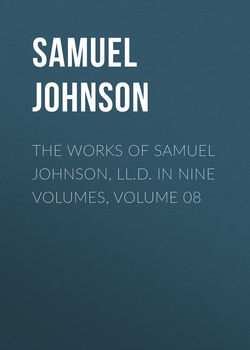Читать книгу The Works of Samuel Johnson, LL.D. in Nine Volumes, Volume 08 - Samuel Johnson - Страница 10
SOMERVILE
ОглавлениеOf Mr.45 Somervile’s life I am not able to say any thing that can satisfy curiosity.
He was a gentleman whose estate was in Warwickshire: his house, where he was born, in 1692, is called Edston, a seat inherited from a long line of ancestors; for he was said to be of the first family in his county. He tells of himself that he was born near the Avon’s banks. He was bred at Winchester-school, and was elected fellow of New college. It does not appear that in the places of his education he exhibited any uncommon proofs of genius or literature. His powers were first displayed in the country, where he was distinguished as a poet, a gentleman, and a skilful and useful justice of the peace.
Of the close of his life, those whom his poems have delighted will read with pain the following account, copied from the letters of his friend Shenstone, by whom he was too much resembled.
“—Our old friend Somervile is dead! I did not imagine I could have been so sorry as I find myself on this occasion: ‘Sublatum quærimus.’ I can now excuse all his foibles; impute them to age, and to distress of circumstances: the last of these considerations wrings my very soul to think on. For a man of high spirit, conscious of having, at least in one production, generally pleased the world, to be plagued and threatened by wretches that are low in every sense; to be forced to drink himself into pains of the body, in order to get rid of the pains of the mind, is a misery.”
He died July 19,1742, and was buried at Wotton, near Henley on Arden.
His distresses need not be much pitied: his estate is said to have been fifteen hundred a-year, which, by his death, devolved to lord Somervile, of Scotland. His mother, indeed, who lived till ninety, had a jointure of six hundred.
It is with regret that I find myself not better enabled to exhibit memorials of a writer, who, at least, must be allowed to have set a good example to men of his own class, by devoting part of his time to elegant knowledge; and who has shown, by the subjects which his poetry has adorned, that it is practicable to be at once a skilful sportsman, and a man of letters.
Somervile has tried many modes of poetry; and though, perhaps, he has not in any reached such excellence as to raise much envy, it may commonly be said, at least, that “he writes very well for a gentleman.” His serious pieces are sometimes elevated, and his trifles are sometimes elegant. In his verses to Addison, the couplet which mentions Clio is written with the most exquisite delicacy of praise; it exhibits one of those happy strokes that are seldom attained. In his odes to Marlborough there are beautiful lines; but, in the second ode, he shows that he knew little of his hero, when he talks of his private virtues. His subjects are commonly such as require no great depth of thought, or energy of expression. His fables are generally stale, and, therefore, excite no curiosity. Of his favourite, the Two Springs, the fiction is unnatural, and the moral inconsequential. In his tales there is too much coarseness, with too little care of language, and not sufficient rapidity of narration.
His great work is his Chase, which he undertook in his maturer age, when his ear was improved to the approbation of blank verse, of which, however, his two first lines give a bad specimen. To this poem praise cannot be totally denied. He is allowed, by sportsmen, to write with great intelligence of his subject, which is the first requisite to excellence; and, though it is impossible to interest the common readers of verse in the dangers or pleasures of the chase, he has done all that transition and variety could easily effect; and has, with great propriety, enlarged his plan by the modes of hunting used in other countries.
With still less judgment did he choose blank verse as the vehicle of Rural Sports. If blank verse be not tumid and gorgeous, it is crippled prose; and familiar images, in laboured language, have nothing to recommend them but absurd novelty, which, wanting the attractions of nature, cannot please long. One excellence of the Splendid Shilling is, that it is short. Disguise can gratify no longer than it deceives46.
45
William.
46
An allusion of approbation is made to the above in Nichol’s Literary Anecdotes of the eighteenth century, ii. 58. Ed.
